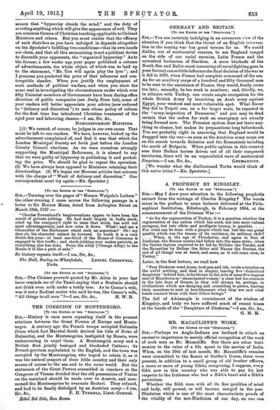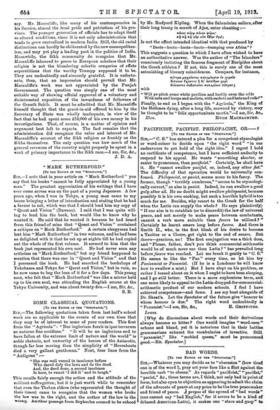MR. M.A.CAULIFFE'S WORK.
[To THE EDITOR OF THE "SPECTATOR."] SIR,—Perhaps we Anglo-Indians are inclined to attach an excessive importance to merely official recognition of the work of such men as Mr. Macauliffe. But there are other testi- monies to the value of a life spent in the service of India. When, on the 20th of last month, Mr. Macauliffe's remains were committed to the flames at Golder's Green, there were present, in addition to a small group of old brother officers, a score or more of young Sikhs, comprising, I suppose, every Sikh now in this country who was able to pay his last respects to the Irishman who had a Sikh's heart and a Sikh's patriotism.
Whether the Sikh race, with all its fine qualities of mind and body, will persist, or will become merged in the pan- Hinduism which is one of the most characteristic proofs of the vitality of the neo-Hinduism of our day, no one can say. Mr. Macauliffe, like many of his contemporaries in his Service, shared the local pride and patriotism of his pro- vince. The younger generation of officials has to adapt itself to altered conditions, since it is not only administration that tends to grow centralized in modern India. Still, the old racial distinctions can hardly be obliterated by the new cosmopolitan- ism, and may yet play a leading part in the politics of India. Meanwhile, the Sikh community do recognize that Mr. Macauliffe laboured to prove to European scholars that their religion is not the blundering eclectic congeries of effete superstitions that the worthy Trurapp supposed it to be. They are undoubtedly and sincerely grateful. It is unfortu- nate, then, that an impression should prevail that Mr. Macauliffe's work was not appreciated by the Punjab Government. The question was simply one of the most suitable way of showing official approval of a voluntary and disinterested exposition of the inwardness of followers of the Granth Sahib. It must be admitted that Mr. Macauliffe himself thought that the grant-in-aid offered to him by the Secretary of State was wholly inadequate, in view of the fact that he had spent some £10,000 of his own money in his investigations. That, of course, is a matter of opinion and argument best left to experts. The fact remains that the administration did recognize the value and interest of Mr. Macauliffe's account of the Sikh religion as frankly as the Sikhs themselves. The only question was how much of the general revenues of the country might properly be spent in a work of primary importance to the Sikh race.—I am, Sir, &c., J. D. A.











































 Previous page
Previous page